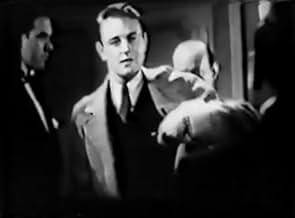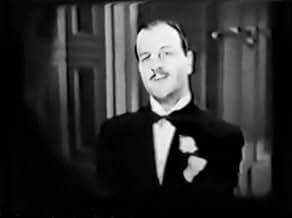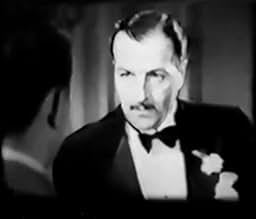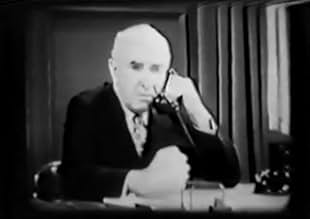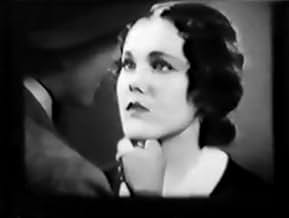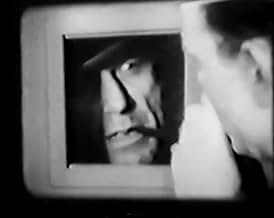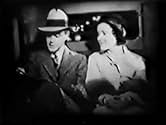A gossip columnist's rise to fame, closely based on the real life of Walter Winchell.A gossip columnist's rise to fame, closely based on the real life of Walter Winchell.A gossip columnist's rise to fame, closely based on the real life of Walter Winchell.
Alan Dinehart
- Roger Jones
- (as Allan Dinehart)
- Director
- Writers
- All cast & crew
- Production, box office & more at IMDbPro
Storyline
Did you know
- TriviaEdward Arnold's first talking feature.
- ConnectionsReferenced in Meet the Baron (1933)
Featured review
A previous IMDb reviewer complained about a poor print of this film. I was able to view a pristine print of "Okay, America!" from the personal collection of film historian William K Everson; that print is now in the New York University archives.
Lew Ayres stars as a brash newspaper columnist and radio broadcaster who's clearly based on Walter Winchell. Ayres starts his radio broadcasts with the catchphrase "Okay, America!" whereas Winchell started his broadcasts with (fake) Morse code and the greeting "Good evening, Mr and Mrs North and South America".
I had to laugh at one unintentionally funny scene in this movie. Ayres, as the surrogate Winchell, visits a nightclub featuring African-American performers, and he chats affectionately with a shapely black dancer whose skimpy costume is obviously inspired by the scanty outfit worn onstage by legendary black performer Josephine Baker. About twenty years after this movie was made, the real Winchell and Baker became bitter enemies -- Winchell famously calling her "Josephoney Baker" in his column -- so I was amused to see their fictional counterparts here on good terms.
The film's plot involves the abduction of a young woman whose father is the President's best friend and a member of his Cabinet. The powerful Production Code of 1930s Hollywood dictated that movies could not depict kidnappers succeeding in their crime, lest some audience member get ideas. A 1930s movie villain might get away with murder, rape and armed robbery, but never kidnapping (at least not in Hollywood).
This is one of those movies in which the virtuous hero is so deeply respected by underworld figures that they'll let him walk out of a deadly situation simply because his word is his bond, even though the crooks have plenty of incentive to kill him.
As the chief villains, Louis Calhern and Edward Arnold are in fine form despite some implausible dialogue. Calhern speaks his lines in his usual cultured accent and impeccable diction, yet his character uses poor grammar ("Larry don't talk"). Arnold's gentleman crimelord reads "Oliver Twist" but seems to consider Fagin the only objectionable character in this novel, suggesting that his lines were written by some scriptwriter who hadn't actually read "Oliver Twist". (That book has a couple of characters even worse than Fagin.)
As the loyal secretary who's secretly in love with her boss Ayres, Maureen O'Sullivan is excellent except for one odd lapse: I don't know whether to blame her, the director or the script. When Ayres and O'Sullivan visit a spooky location, O'Sullivan drops her clutch purse to register shocked emotions, but then she leaves without retrieving it ... thus reminding us that she's an actress handling a wardrobe accessory, instead of a real person with keys and money and I.D. in that purse.
Charles Dow Clark is good in a role that's irrelevant to the story, and Rollo Lloyd acquits himself well in a deeply implausible role. We never do learn how Lloyd's drunken ex-reporter manages to get that big scoop.
The taxicab that recurs throughout this Universal movie (Yellow Cab #79) also shows up in Columbia's film "Washington Merry-Go-Round".
The unnamed President in this movie is apparently meant to be the actual President in office in 1932, Herbert Hoover; a line of dialogue implies that he's Republican. Ayres's scene in the President's office shows the Chief Executive only in silhouette (implausibly standing up while addressing visitors, rather than sitting), intoning his lines in a stentorian voice totally unlike the real Hoover's.
Margaret Lindsay is effective in a tiny role as the kidnap victim who triggers all the fuss. One of my favourite character actors, Alan Dinehart, is here as Ayres's boss, earning a punch on the jaw for his efforts. Dinehart usually played shifty chancers or outright crooks; he's less plausible than usual here as an honest journalist. Russian actor Akim Tamiroff, in his first film role, is apparently already typecast as a Mexican (his character here is cried Pedro).
Too many Hollywood movies feature unbreakable heroes: the leading man gets beaten up in one scene, and in the next reel he's as good as new. That trend stayed in place until 'Chinatown', with Jack Nicholson sporting a bandaged nose for half the movie. I was impressed by a minor detail in "Okay, America!": about halfway through this movie, Ayres gets roughed up, and for the rest of the film he has a cut on his upper lip that's visible only in close-ups. (Or maybe Ayres cut himself in real life while this film was in production.)
There are a lot of good things in 'Okay, America!', but the film's main flaw is the casting of Lew Ayres in the lead role. Ayres was a bland actor: he's decent enough here, but there were several other Hollywood actors of this period (James Cagney, Lee Tracy, Pat O'Brien, James Dunn, Wallace Ford) who could have been brilliant in this role. To achieve such an influential position as a crusading broadcaster and columnist, this movie's hero would have needed to be a human dynamo, yet Ayres's performance never really catches that spark. O'Sullivan is better in a subtler role. Mostly because of Ayres's lacklustre effort, I'll rate this one only 6 out of 10.
Lew Ayres stars as a brash newspaper columnist and radio broadcaster who's clearly based on Walter Winchell. Ayres starts his radio broadcasts with the catchphrase "Okay, America!" whereas Winchell started his broadcasts with (fake) Morse code and the greeting "Good evening, Mr and Mrs North and South America".
I had to laugh at one unintentionally funny scene in this movie. Ayres, as the surrogate Winchell, visits a nightclub featuring African-American performers, and he chats affectionately with a shapely black dancer whose skimpy costume is obviously inspired by the scanty outfit worn onstage by legendary black performer Josephine Baker. About twenty years after this movie was made, the real Winchell and Baker became bitter enemies -- Winchell famously calling her "Josephoney Baker" in his column -- so I was amused to see their fictional counterparts here on good terms.
The film's plot involves the abduction of a young woman whose father is the President's best friend and a member of his Cabinet. The powerful Production Code of 1930s Hollywood dictated that movies could not depict kidnappers succeeding in their crime, lest some audience member get ideas. A 1930s movie villain might get away with murder, rape and armed robbery, but never kidnapping (at least not in Hollywood).
This is one of those movies in which the virtuous hero is so deeply respected by underworld figures that they'll let him walk out of a deadly situation simply because his word is his bond, even though the crooks have plenty of incentive to kill him.
As the chief villains, Louis Calhern and Edward Arnold are in fine form despite some implausible dialogue. Calhern speaks his lines in his usual cultured accent and impeccable diction, yet his character uses poor grammar ("Larry don't talk"). Arnold's gentleman crimelord reads "Oliver Twist" but seems to consider Fagin the only objectionable character in this novel, suggesting that his lines were written by some scriptwriter who hadn't actually read "Oliver Twist". (That book has a couple of characters even worse than Fagin.)
As the loyal secretary who's secretly in love with her boss Ayres, Maureen O'Sullivan is excellent except for one odd lapse: I don't know whether to blame her, the director or the script. When Ayres and O'Sullivan visit a spooky location, O'Sullivan drops her clutch purse to register shocked emotions, but then she leaves without retrieving it ... thus reminding us that she's an actress handling a wardrobe accessory, instead of a real person with keys and money and I.D. in that purse.
Charles Dow Clark is good in a role that's irrelevant to the story, and Rollo Lloyd acquits himself well in a deeply implausible role. We never do learn how Lloyd's drunken ex-reporter manages to get that big scoop.
The taxicab that recurs throughout this Universal movie (Yellow Cab #79) also shows up in Columbia's film "Washington Merry-Go-Round".
The unnamed President in this movie is apparently meant to be the actual President in office in 1932, Herbert Hoover; a line of dialogue implies that he's Republican. Ayres's scene in the President's office shows the Chief Executive only in silhouette (implausibly standing up while addressing visitors, rather than sitting), intoning his lines in a stentorian voice totally unlike the real Hoover's.
Margaret Lindsay is effective in a tiny role as the kidnap victim who triggers all the fuss. One of my favourite character actors, Alan Dinehart, is here as Ayres's boss, earning a punch on the jaw for his efforts. Dinehart usually played shifty chancers or outright crooks; he's less plausible than usual here as an honest journalist. Russian actor Akim Tamiroff, in his first film role, is apparently already typecast as a Mexican (his character here is cried Pedro).
Too many Hollywood movies feature unbreakable heroes: the leading man gets beaten up in one scene, and in the next reel he's as good as new. That trend stayed in place until 'Chinatown', with Jack Nicholson sporting a bandaged nose for half the movie. I was impressed by a minor detail in "Okay, America!": about halfway through this movie, Ayres gets roughed up, and for the rest of the film he has a cut on his upper lip that's visible only in close-ups. (Or maybe Ayres cut himself in real life while this film was in production.)
There are a lot of good things in 'Okay, America!', but the film's main flaw is the casting of Lew Ayres in the lead role. Ayres was a bland actor: he's decent enough here, but there were several other Hollywood actors of this period (James Cagney, Lee Tracy, Pat O'Brien, James Dunn, Wallace Ford) who could have been brilliant in this role. To achieve such an influential position as a crusading broadcaster and columnist, this movie's hero would have needed to be a human dynamo, yet Ayres's performance never really catches that spark. O'Sullivan is better in a subtler role. Mostly because of Ayres's lacklustre effort, I'll rate this one only 6 out of 10.
- F Gwynplaine MacIntyre
- May 2, 2010
- Permalink
Details
- Runtime1 hour 18 minutes
- Color
- Aspect ratio
- 1.37 : 1
Contribute to this page
Suggest an edit or add missing content


